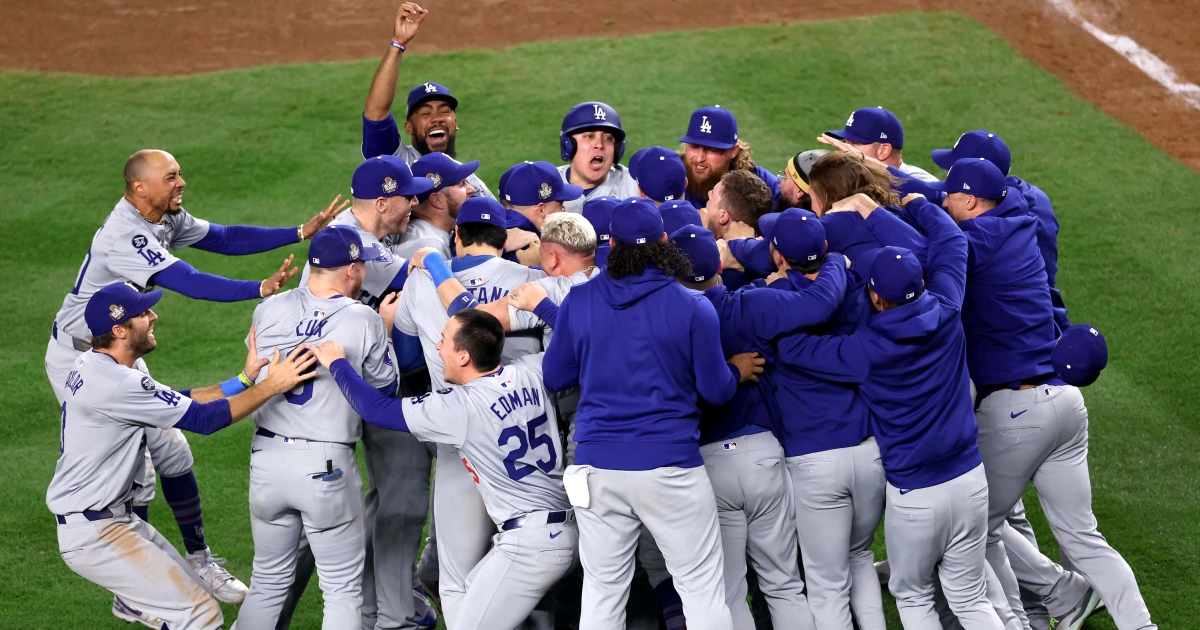The Los Angeles Dodgers have built a reputation for resilience, and in Game 2 of their playoff series, they proved once again why they are one of the most dangerous teams in baseball. Trailing late, the Dodgers staged a dramatic comeback in the ninth inning before sealing the victory in the 10th, knotting the series at one game apiece and shifting momentum in their favor. It was a game that encapsulated the heart, skill, and sheer unpredictability of postseason baseball—a contest that will be remembered for its tension, heroics, and the unshakable belief of a team that refuses to go down without a fight.
From the first pitch, the game was a tightly contested battle. The opposing team, who had taken Game 1 in convincing fashion, came out strong again, putting pressure on Dodgers starter Tyler Glasnow. Glasnow, known for his electric fastball and devastating breaking pitches, worked through early traffic, stranding runners in scoring position in the first two innings. The Dodgers’ offense, however, struggled to break through against their opponent’s ace, who kept them off balance with a mix of pinpoint fastballs and sharp sliders.
The game remained scoreless until the fifth inning, when the opposition broke through. A leadoff double followed by a well-placed single gave them a 1-0 lead. The Dodgers had their chances to respond, but clutch hitting eluded them early. In the sixth, they loaded the bases with two outs, only for a sharp line drive to find the glove of the opposing center fielder, ending the threat. The missed opportunity loomed large as the game entered the late innings, with the Dodgers still searching for their first run.
As the tension mounted, the bullpens took over. The Dodgers’ relievers did their part, keeping the deficit at one run. Evan Phillips and Brusdar Graterol delivered scoreless innings, giving the offense a chance. But as the game entered the ninth, time was running out. Facing one of the league’s most dominant closers, the Dodgers’ hopes seemed slim. The opposing pitcher had been nearly unhittable all season, with a triple-digit fastball and a wipeout slider that had buried countless opponents.
Then, the magic began.
Mookie Betts, the Dodgers’ sparkplug, worked a grueling at-bat, fouling off pitch after pitch before finally drawing a walk. The crowd, which had been subdued for much of the night, suddenly came alive. Freddie Freeman, ever the professional hitter, followed with a sharp single to right, putting the tying run in scoring position with no outs. The momentum had shifted. The closer, now rattled, bounced a wild pitch, allowing the runners to advance. Will Smith, the Dodgers’ steady catcher, then delivered the biggest hit of the night—a sacrifice fly to deep center, scoring Betts and tying the game. Just like that, the Dodgers had clawed back from the brink.
The game headed to extra innings, and the Dodgers’ bullpen continued to hold firm. Blake Treinen, making his first postseason appearance in years, worked a scoreless top of the 10th, stranding the automatic runner at third with a clutch strikeout and a diving play by Betts at shortstop. With the score still tied, the stage was set for more drama in the bottom of the inning.
The Dodgers’ half of the 10th began with Jason Heyward, a veteran presence known for his postseason experience, placed at second base as the automatic runner. Chris Taylor, pinch-hitting, worked a walk, putting the winning run in scoring position. Then came Enrique Hernández, a fan favorite who had already made several key defensive plays in the series. Hernández, known for his flair for the dramatic, stepped in against a tiring reliever.
On a 2-1 count, Hernández got a fastball middle-in and didn’t miss it. He drove the ball deep to left-center, splitting the outfielders. Heyward raced home from second, and as the ball rolled to the wall, Taylor sprinted around third, sliding headfirst into home just ahead of the throw. The Dodgers erupted from the dugout, mobbing Hernández at second base as the crowd roared in disbelief and elation. In a game that had seemed lost just an inning earlier, the Dodgers had completed a stunning comeback, winning 2-1 and ensuring the series would head to the next game all square.
The victory was a testament to the Dodgers’ depth, resilience, and unwavering belief. Every player contributed—whether it was Glasnow battling through early trouble, the bullpen delivering zero after zero, or the lineup grinding out at-bats when it mattered most. But it was Hernández, the unsung hero, who delivered the final blow, reminding everyone why baseball is the most unpredictable and thrilling sport in the world.
For the opposition, it was a devastating loss. They had been three outs away from taking a commanding 2-0 series lead, only to see it slip away in the blink of an eye. Their closer, usually automatic, had been human for one night, and it cost them dearly. Now, instead of being in full control, they find themselves in a best-of-three with the Dodgers suddenly surging.
As the series shifts to the next game, the Dodgers carry not just a tied series but also the psychological edge. They know they can win in any situation, no matter how dire. They know their bullpen can shut the door when needed, and their offense can strike at any moment. Most importantly, they know they have the heart of a champion.
For fans, this game was a reminder of why they love baseball—the tension, the drama, the euphoria of a walk-off win. For the Dodgers, it was a statement: they may bend, but they will not break. And in October, that kind of resilience can take a team all the way.
The series is far from over, but after a night like this, one thi



